Burt A. The Evolution of the British Empire and Commonwealth From the American Revolution
Подождите немного. Документ загружается.


The
Statute
of
Westminster
and
the
Shaping of
the Commonwealth
775
into
what
was
virtually
a
republic
standing
outside
the
commonwealth,
he
refused
to take
the
final
step.
He
feared
the effect
on his own
people,
who
had
fought
a
fierce civil
war on this
very
issue and
were still
deeply
divided
over it.
He
feared the
effect on
the British
government,
with
whom he
had
yet
to
negotiate
a
termination
of
the tariff
war,
which
was
strangling
the
economic life
of the
country,
and
the
surrender
of
the British
treaty
right
to hold
Irish
ports.
He also
hoped
to
regularize
external
association
by
an
amicable
Anglo-Irish
agreement.
But
what
he feared
most
of
all,
by
his
own
admission,
was the
effect
on Northern
Ireland,
which
might
make
partition
irrevocable.
Here was
his one
great
delusion,
the
crowning
tragedy
of his
career.
Though
the
Roman
Catholic
third
of the
population
of
Northern
Ireland
consistently
opposed partition,
the
Protestant
two
thirds,
who
resented
it
in
the
beginning
but
accepted
it as a sacrifice
necessary
for
the
sake
of
peace
in
die rest
of
the
country,
had
since
come
to
regard
it
as
the
rock of their
salvation.
This
changed
attitude was
incompre-
hensible to de
Valera.
He
was ever
expecting
the
perverse majority
in
the North
to
repent
of their sin
against
the Irish
nation and to return
to
its
bosom.
Blinded
by
his
own
fanaticism,
he
could
not see that his
whole
policy
was
greatly
responsible
for
driving
Ulster Unionists fur-
ther
away.
Hard as their
hearts
were,
the new
constitution
made
them
harder
still;
for
it
set
up
a
new
state
named
Eire,
which in
plain
English
is
Ireland,
and it
boldly
asserted
that
the national
territory
included
all of
Ireland,
its islands and territorial
seas.
"Pending
the
reintegration
of
the
National
territory,"
the constitution
continued,
"and without
prejudice
to
the
right
of the
parliament
and
government
established
by
this
Constitution
to
exercise
jurisdiction
over the whole
of
that
terri-
tory,"
the
laws of
Eke
would
apply
only
to the same
extent as
those
of
the
former Irish Free State.
When de
Valera had settled his
other ac-
counts
with Britain
and
another
world
war
was
impending,
he
swore
that he
would
not
depart
from
neutrality
to win the
inclusion
of North-
ern
Ireland;
yet
he still refrained from
declaring
a
republic
and
repeal-
ing
the External
Relations Act lest
he make
the reunion
of
Ireland
forever
impossible.
To
complete
the
irony,
the
very
success of
his na-
tionalist
policy
converted
the
opposition party
which,
on
returning
to
power
after the Second World
War,
carried
that
policy
to
its
logical
conclusion.
Though
the Irish
dominion
ceased
to
exist when
Eire
superseded
the
Irish
Free
State,
the
rest of
the
commonwealth
played
make-believe
over
the
departure
of
this
dominion
member
by
refusing
to
recognize
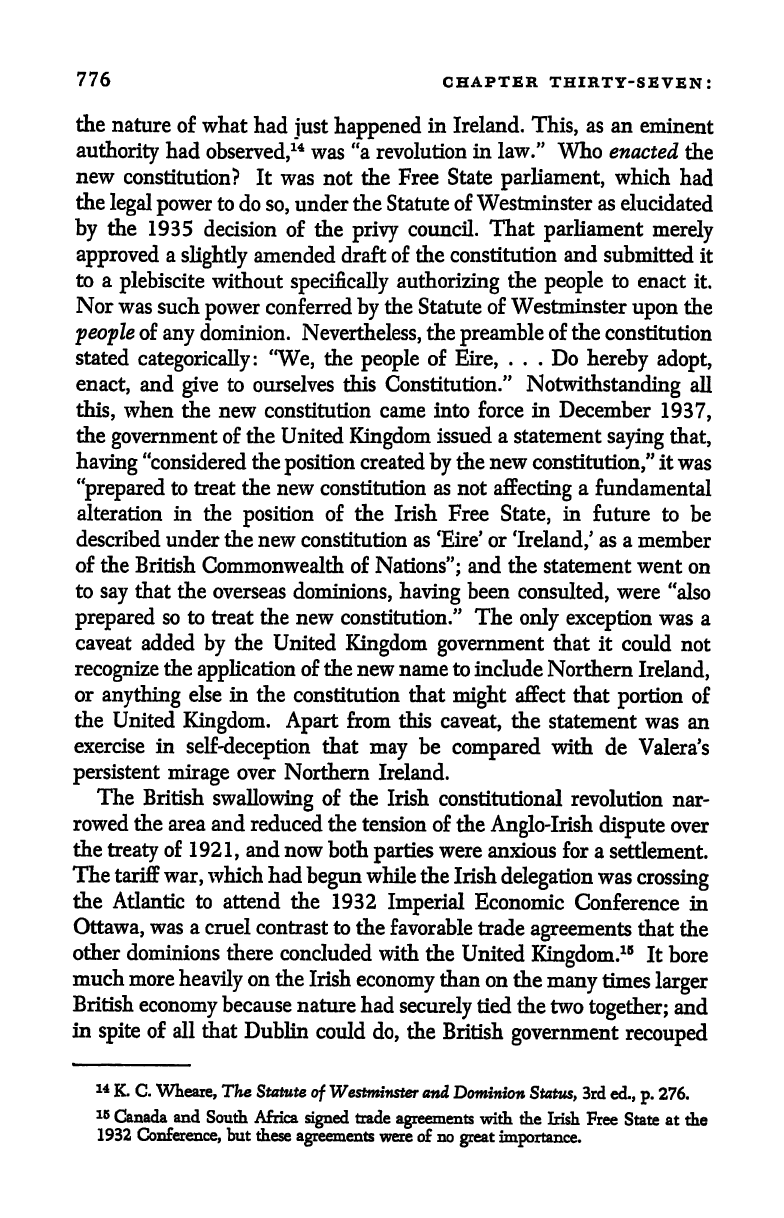
776
CHAPTER
THIRTY-SEVEN:
the
nature
of
what
had
just
happened
in Ireland.
This,
as
an
eminent
authority
had
observed,
14
was
"a
revolution
in law."
Who
enacted
the
new
constitution?
It
was
not
the
Free State
parliament,
which
had
the
legal power
to
do
so,
under
the Statute
of Westminster as
elucidated
by
the
1935
decision
of the
privy
council.
That
parliament
merely
approved
a
slightly
amended
draft of the constitution
and
submitted
it
to a
plebiscite
without
specifically
authorizing
the
people
to
enact
it.
Nor
was
such
power
conferred
by
the Statute of
Westminster
upon
the
people
of
any
dominion.
Nevertheless,
the
preamble
of the
constitution
stated
categorically:
"We,
the
people
of
Eire,
...
Do
hereby
adopt,
enact,
and
give
to
ourselves this
Constitution."
Notwithstanding
all
this,
when
the new
constitution
came
into
force
in
December
1937,
the
government
of the United
Kingdom
issued
a
statement
saying
that,
having
"considered
the
position
created
by
the
new
constitution,"
it
was
"prepared
to
treat the
new constitution
as
not
affecting
a
fundamental
alteration in the
position
of the Irish Free
State,
in
future
to
be
described under the new constitution as 'Eire'
or
Ireland/
as a
member
of
the British
Commonwealth
of
Nations";
and the statement
went
on
to
say
that
the
overseas
dominions,
having
been
consulted,
were
"also
prepared
so
to
treat the new constitution."
The
only
exception
was a
caveat
added
by
the United
Kingdom government
that it
could
not
recognize
the
application
of
the
new name
to include Northern
Ireland,
or
anything
else in the
constitution
that
might
affect
that
portion
of
the United
Kingdom.
Apart
from
this
caveat,
the
statement
was an
exercise in
self-deception
that
may
be
compared
with
de
Valera's
persistent
mirage
over
Northern
Ireland.
The British
swallowing
of
the Irish
constitutional
revolution nar-
rowed
the area
and
reduced the tension of
the
Anglo-Irish
dispute
over
the
treaty
of
1921,
and now
both
parties
were
anxious
for
a
settlement.
The tariff
war,
which
had
begun
while the
Irish
delegation
was
crossing
the
Atlantic to attend
the
1932
Imperial
Economic
Conference
in
Ottawa,
was a
cruel
contrast to
the
favorable trade
agreements
that
the
other
dominions there
concluded with
the
United
Kingdom.
15
It
bore
much more
heavily
on the
Irish
economy
than
on
the
many
times
larger
British
economy
because
nature
had
securely
tied the
two
together;
and
in
spite
of all that
Dublin
could
do,
the
British
government
recouped
14
K. C.
Wheare,
The
Statute
of
Westminster
and
Dominion
Status,
3rd
ed.,
p.
276.
16
Canada and
South Africa
signed
trade
agreements
with
the
Irish
Free
State at
the
1932
Conference,
but
these
agreements
were of
no
great
importance.
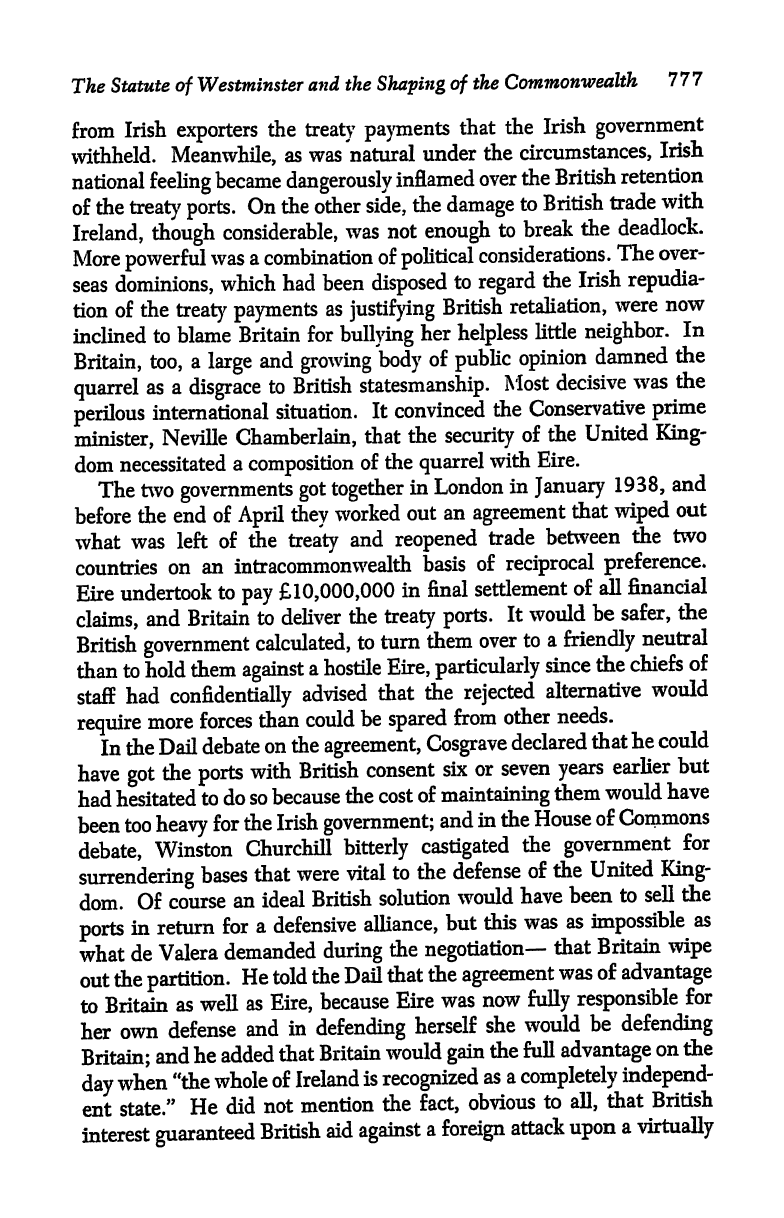
The
Statute
of
Westminster
and
the
Shaping
of
the
Commonwealth
777
from
Irish
exporters
the
treaty
payments
that
the Irish
government
withheld.
Meanwhile,
as
was
natural
under
the
circumstances,
Irish
national
feeling
became
dangerously
inflamed
over
the
British
retention
of
the
treaty
ports.
On
the other
side,
the
damage
to
British
trade
with
Ireland,
though
considerable,
was
not
enough
to
break
the
deadlock.
More
powerful
was
a combination
of
political
considerations.
The
over-
seas
dominions,
which
had been
disposed
to
regard
the
Irish
repudia-
tion
of
the
treaty payments
as
justifying
British
retaliation,
were
now
inclined
to
blame
Britain
for
bullying
her
helpless
little
neighbor.
In
Britain,
too,
a
large
and
growing
body
of
public
opinion
damned
the
quarrel
as
a
disgrace
to
British
statesmanship.
Most
decisive
was
the
perilous
international
situation.
It
convinced
the Conservative
prime
minister,
Neville
Chamberlain,
that
the
security
of
the
United
King-
dom
necessitated
a
composition
of
the
quarrel
with
Eire.
The
two
governments
got
together
in
London
in
January
1938,
and
before
the
end
of
April
they
worked
out
an
agreement
that
wiped
out
what
was left
of
the
treaty
and
reopened
trade between
the
two
countries
on
an
intracommonwealth
basis
of
reciprocal
preference.
Eire
undertook
to
pay
10,000,000
in
final
settlement
of
all
financial
claims,
and
Britain
to
deliver
the
treaty ports.
It
would
be
safer,
the
British
government
calculated,
to
turn
them
over
to
a
friendly
neutral
than
to
hold
them
against
a hostile
Eire,
particularly
since
the
chiefs
of
staff
had
confidentially
advised
that
the
rejected
alternative
would
require
more
forces
than
could
be
spared
from
other
needs.
In the
Dail
debate
on
the
agreement,
Cosgrave
declared
that
he
could
have
got
the
ports
with
British
consent
six
or
seven
years
earlier
but
had
hesitated
to do
so
because
the
cost
of
maintaining
them
would
have
been
too
heavy
for
the
Irish
government;
and
in
the
House
of
Commons
debate,
Winston
Churchill
bitterly
castigated
the
government
for
surrendering
bases
that
were
vital
to
the defense
of
the
United
King-
dom.
Of
course
an
ideal
British
solution
would
have
been
to
sell
the
ports
in
return
for
a
defensive
alliance,
but
this
was
as
impossible
as
what
de
Valera
demanded
during
the
negotiation
that
Britain
wipe
out
the
partition.
He
told
the
Dan
that
the
agreement
was of
advantage
to
Britain
as
well
as
Eire,
because
Eire
was
now
fully
responsible
for
her
own
defense
and
in
defending
herself
she
would
be
defending
Britain;
and
he
added
that
Britain
would
gain
the
full
advantage
on
the
day
when
"the
whole
of
Ireland
is
recognized
as
a
completely
independ-
ent
state."
He
did
not
mention
the
fact,
obvious
to
all,
that
British
interest
guaranteed
British
aid
against
a
foreign
attack
upon
a
virtually
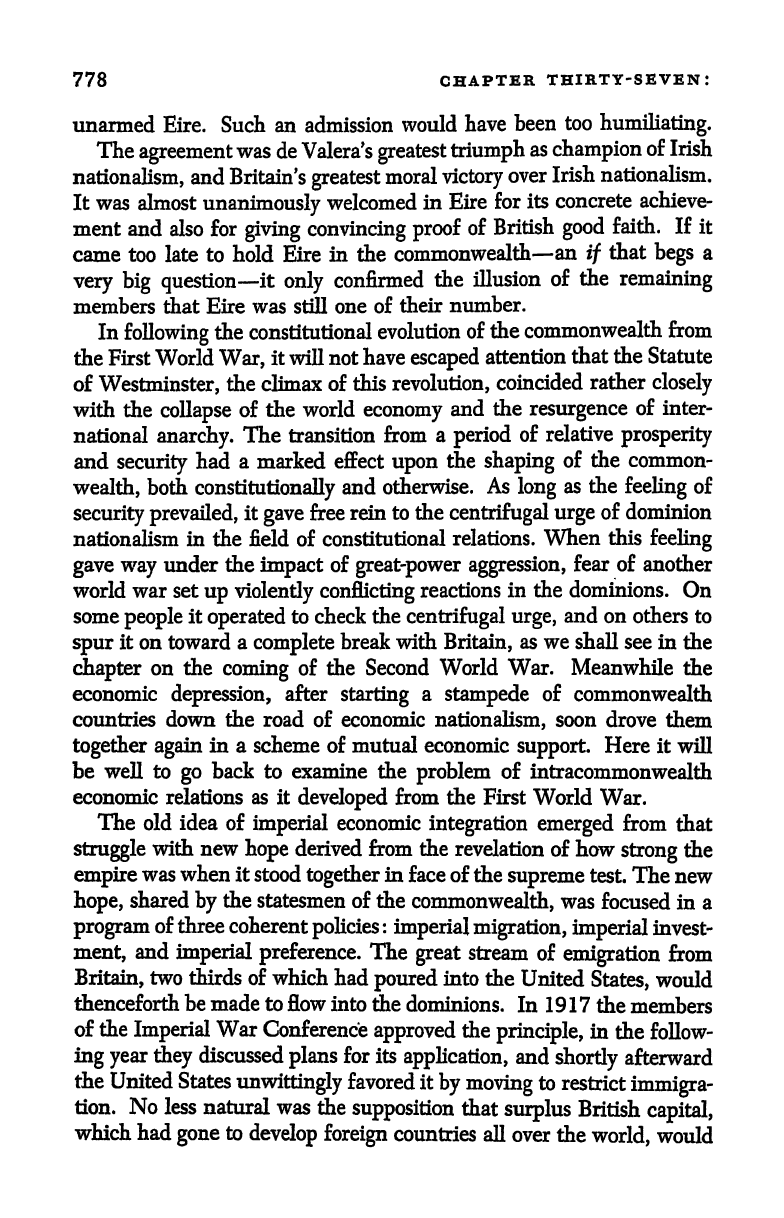
778
CHAPTER
THIRTY-SEVEN:
unarmed
Eire.
Such
an
admission
would
have
been
too
humiliating.
The
agreement
was
de
Valera's
greatest
triumph
as
champion
of
Irish
nationalism,
and Britain's
greatest
moral
victory
over
Irish nationalism.
It was almost
unanimously
welcomed
in
Eire
for
its
concrete
achieve-
ment and also for
giving
convincing
proof
of
British
good
faith. If
it
came too late
to
hold Eire
in
the
commonwealth
an
if
that
begs
a
very
big
question
it
only
confirmed
the illusion
of
the
remaining
members
that Eire was still one
of
their
number.
In
following
the constitutional
evolution
of
the
commonwealth
from
the
First
World
War,
it
will
not
have
escaped
attention
that
the
Statute
of
Westminster,
the climax
of
this
revolution,
coincided
rather
closely
with the
collapse
of the world
economy
and
the
resurgence
of inter-
national
anarchy.
The
transition
from a
period
of
relative
prosperity
and
security
had
a
marked effect
upon
the
shaping
of
the common-
wealth,
both
constitutionally
and otherwise.
As
long
as
the
feeling
of
security prevailed,
it
gave
free
rein
to the
centrifugal
urge
of dominion
nationalism
in
the field of constitutional
relations.
When
this
feeling
gave
way
under the
impact
of
great-power
aggression,
fear of
another
world
war
set
up
violently
conflicting
reactions
in the dominions.
On
some
people
it
operated
to check the
centrifugal
urge,
and
on others to
spur
it
on
toward
a
complete
break
with
Britain,
as
we
shall see
in the
chapter
on
the
coming
of
the Second World
War.
Meanwhile
the
economic
depression,
after
starting
a
stampede
of
commonwealth
countries
down the
road of economic
nationalism,
soon
drove
them
together again
in a
scheme
of
mutual
economic
support.
Here it
will
be
well to
go
back
to
examine
the
problem
of
intracommonwealth
economic relations
as it
developed
from the First
World War.
The
old idea of
imperial
economic
integration
emerged
from
that
struggle
with new
hope
derived from
the
revelation
of how
strong
the
empire
was when it
stood
together
in face of the
supreme
test. The
new
hope,
shared
by
the statesmen
of the
commonwealth,
was
focused
in
a
program
of three
coherent
policies
:
imperial
migration, imperial
invest-
ment,
and
imperial
preference.
The
great
stream
of
emigration
from
Britain,
two thirds of
which
had
poured
into
the
United
States,
would
thenceforth be
made to flow
into the
dominions.
In 1 9 1 7
the
members
of
the
Imperial
War
Conference
approved
the
principle,
in
the
follow-
ing
year
they
discussed
plans
for its
application,
and
shortly
afterward
the United States
unwittingly
favored
it
by
moving
to
restrict
immigra-
tion.
No
less
natural was
the
supposition
that
surplus
British
capital,
which had
gone
to
develop
foreign
countries
all over
the
world,
would
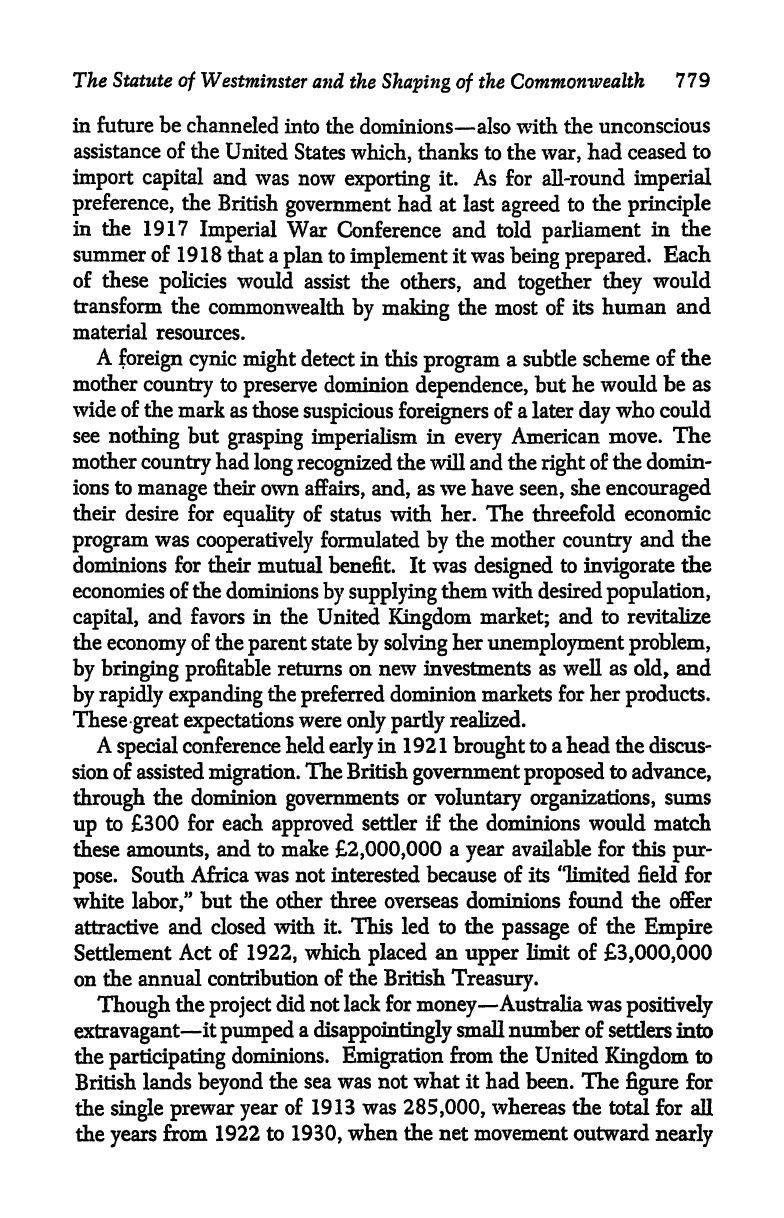
The
Statute
of
Westminster
and
the
Shaping
of
the
Common-wealth
779
in future
be
channeled
into the
dominions also
with
the unconscious
assistance
of
the
United
States
which,
thanks
to
the
war,
had ceased
to
import
capital
and
was now
exporting
it.
As for all-round
imperial
preference,
the
British
government
had at last
agreed
to
the
principle
in the
1917
Imperial
War
Conference
and told
parliament
in
the
summer
of 19
1 8
that
a
plan
to
implement
it was
being
prepared.
Each
of
these
policies
would
assist the
others,
and
together
they
would
transform
the
commonwealth
by making
the most of
its human
and
material
resources.
A
foreign
cynic
might
detect
in
this
program
a subtle
scheme
of the
mother
country
to
preserve
dominion
dependence,
but
he
would
be as
wide of the
mark
as
those
suspicious
foreigners
of
a
later
day
who
could
see
nothing
but
grasping
imperialism
in
every
American
move. The
mother
country
had
long
recognized
the will and
the
right
of
the domin-
ions to
manage
their
own
affairs,
and,
as we have
seen,
she
encouraged
their
desire
for
equality
of status with
her. The
threefold
economic
program
was
cooperatively
formulated
by
the mother
country
and
the
dominions
for their
mutual
benefit.
It
was
designed
to
invigorate
the
economies
of the
dominions
by
supplying
them with
desired
population,
capital,
and favors
in
the
United
Kingdom
market;
and to
revitalize
the
economy
of the
parent
state
by
solving
her
unemployment problem,
by
bringing
profitable
returns on
new
investments
as well
as
old,
and
by
rapidly expanding
the
preferred
dominion markets for
her
products.
These
great
expectations
were
only partly
realized.
A
special
conference
held
early
in 192
1
brought
to
a
head the
discus-
sion of assisted
migration.
The
British
government
proposed
to
advance,
through
the
dominion
governments
or
voluntary
organizations,
sums
up
to
300
for each
approved
settler if the
dominions would match
these
amounts,
and to
make
2,000,000
a
year
available
for
this
pur-
pose.
South Africa
was not
interested because of its "limited
field
for
white
labor/'
but the other
three overseas
dominions found the offer
attractive
and closed
with
it.
This
led
to
the
passage
of
the
Empire
Settlement
Act of
1922,
which
placed
an
upper
limit of
3,000,000
on
the
annual
contribution
of the British
Treasury.
Though
the
project
did not
lack for
money
Australia
was
positively
extravagant
it
pumped
a
disappointingly
small number
of settlers
info
the
participating
dominions.
Emigration
from the
United
Kingdom
to
British
lands
beyond
the
sea
was
not
what
it
had been. The
figure
for
the
single
prewar
year
of
1913 was
285,000,
whereas the
total
for
all
the
years
from 1922
to
1930,
when the
net
movement
outward
nearly
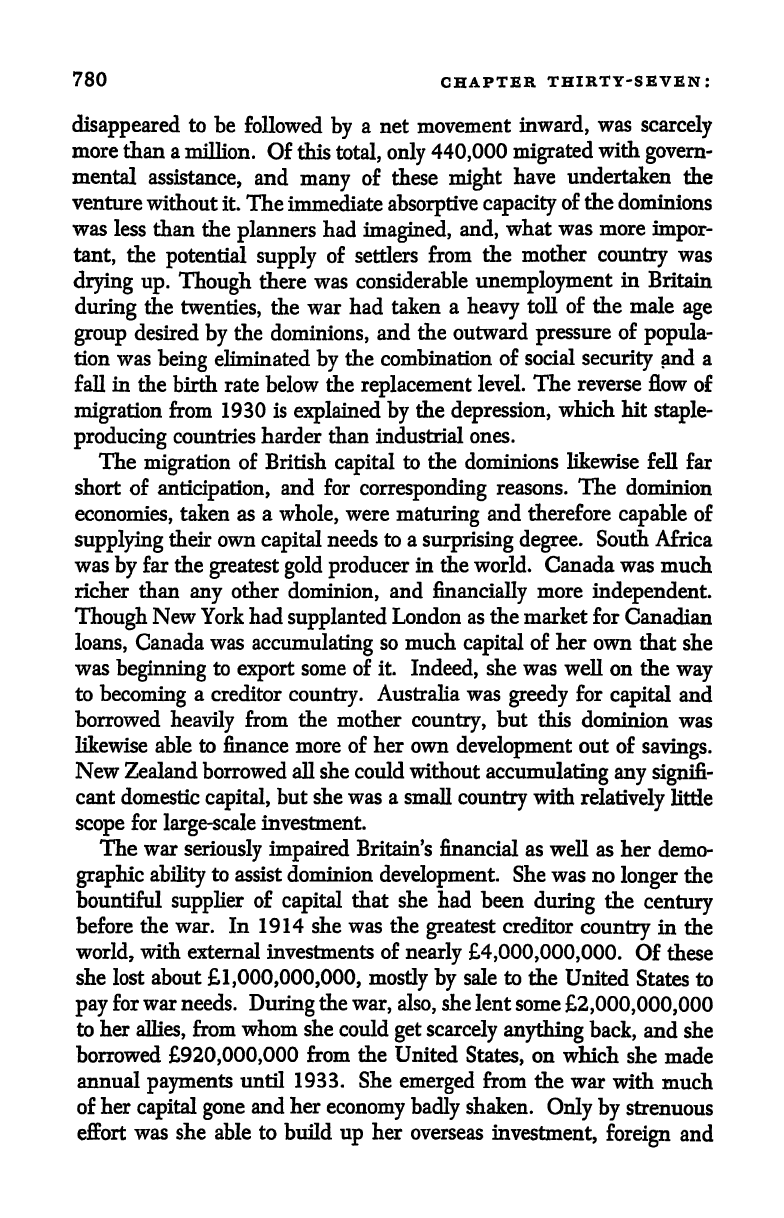
780
CHAPTER
THIRTY-SEVEN:
disappeared
to
be
followed
by
a net movement
inward,
was
scarcely
more
than a
million.
Of this
total,
only
440,000
migrated
with
govern-
mental
assistance,
and
many
of
these
might
have
undertaken
the
venture
without it.
The
immediate
absorptive
capacity
of
the
dominions
was
less than
the
planners
had
imagined,
and,
what
was more
impor-
tant,
the
potential
supply
of settlers
from
the
mother
country
was
drying
up.
Though
there was
considerable
unemployment
in
Britain
during
the
twenties,
the war had
taken
a
heavy
toll
of
the male
age
group
desired
by
the
dominions,
and
the outward
pressure
of
popula-
tion
was
being
eliminated
by
the combination
of
social
security
and
a
fall
in the
birth rate
below
the
replacement
level.
The
reverse
flow
of
migration
from 1930 is
explained
by
the
depression,
which hit
staple-
producing
countries harder than industrial
ones.
The
migration
of
British
capital
to
the dominions
likewise
fell
far
short
of
anticipation,
and
for
corresponding
reasons.
The
dominion
economies,
taken
as
a
whole,
were
maturing
and
therefore
capable
of
supplying
their own
capital
needs to
a
surprising degree.
South
Africa
was
by
far the
greatest gold
producer
in the
world.
Canada
was
much
richer
than
any
other
dominion,
and
financially
more
independent.
Though
New York had
supplanted
London as
the market
for
Canadian
loans,
Canada
was
accumulating
so much
capital
of
her
own
that
she
was
beginning
to
export
some of it.
Indeed,
she was well
on the
way
to
becoming
a
creditor
country.
Australia was
greedy
for
capital
and
borrowed
heavily
from the
mother
country,
but this
dominion
was
likewise
able
to finance more of
her
own
development
out
of
savings.
New
Zealand borrowed all
she
could
without
accumulating any
signifi-
cant
domestic
capital,
but she
was a
small
country
with
relatively
little
scope
for
large-scale
investment.
The
war
seriously impaired
Britain's
financial as well
as her
demo-
graphic
ability
to
assist dominion
development.
She
was
no
longer
the
bountiful
supplier
of
capital
that
she
had been
during
the
century
before
the war. In
1914
she was the
greatest
creditor
country
in
the
world,
with external investments of
nearly
4,000,000,000.
Of
these
she lost
about
1,000,000,000,
mostly by
sale to
the
United
States to
pay
for
war
needs.
During
the
war,
also,
she
lent
some
2,000,000,000
to her
allies,
from
whom
she
could
get
scarcely
anything
back,
and she
borrowed
920,000,000
from the
United
States,
on
which
she
made
annual
payments
until 1933.
She
emerged
from
the
war
with
much
of
her
capital
gone
and
her
economy badly
shaken.
Only by
strenuous
effort
was she
able to build
up
her
overseas
investment,
foreign
and
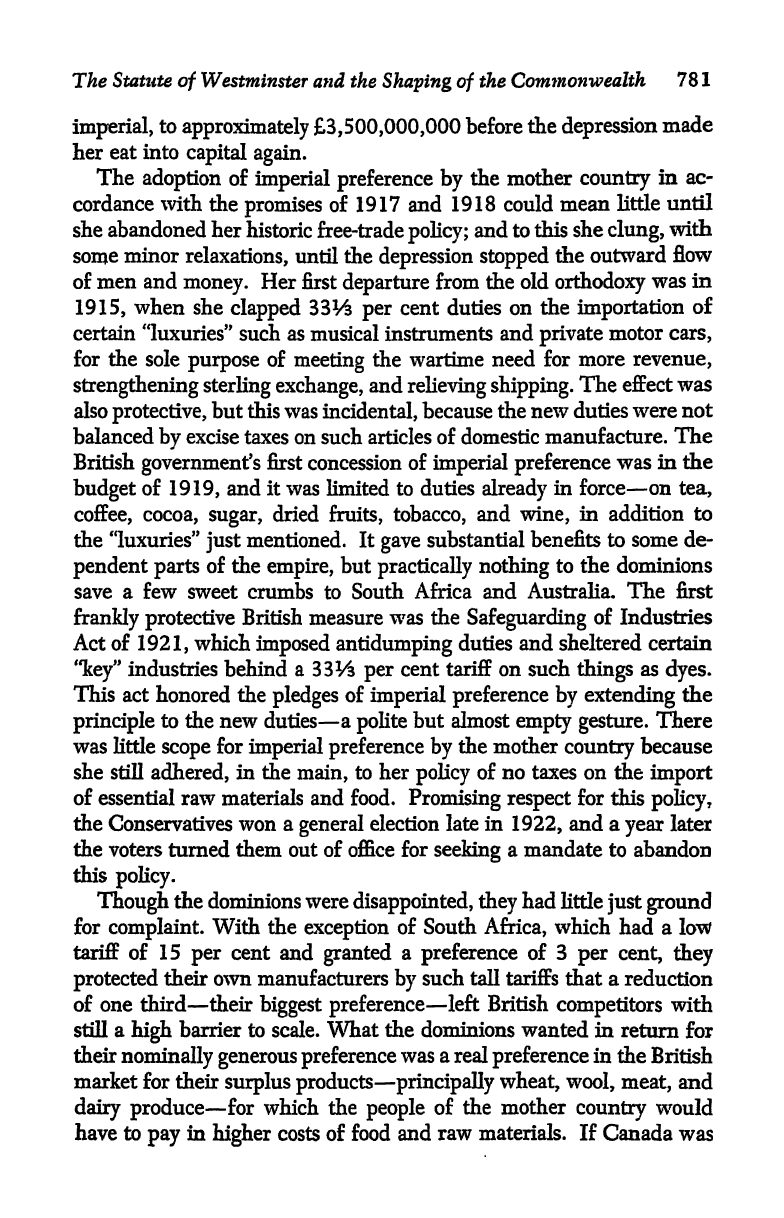
The
Statute
of
Westminster and the
Shaping
of
the
Commonwealth
78
1
imperial,
to
approximately
3,500,000,000
before
the
depression
made
her
eat into
capital
again.
The
adoption
of
imperial
preference
by
the
mother
country
in
ac-
cordance
with
the
promises
of 1917
and
1918
could
mean
little
until
she abandoned her
historic free-trade
policy;
and to
this
she
clung,
with
some
minor
relaxations,
until the
depression
stopped
the
outward
flow
of men and
money.
Her
first
departure
from
the old
orthodoxy
was
in
1915,
when
she
clapped
33V&
per
cent duties on
the
importation
of
certain
"luxuries"
such as
musical instruments
and
private
motor
cars,
for
the
sole
purpose
of
meeting
the
wartime need
for
more
revenue,
strengthening sterling
exchange,
and
relieving shipping.
The
effect
was
also
protective,
but this
was
incidental,
because
the
new duties
were
not
balanced
by
excise
taxes
on
such articles
of
domestic
manufacture.
The
British
government's
first
concession
of
imperial
preference
was in
the
budget
of
1919,
and
it was
limited
to duties
already
in
force
on
tea,
coffee,
cocoa,
sugar,
dried
fruits, tobacco,
and
wine,
in addition
to
the "luxuries"
just
mentioned. It
gave
substantial
benefits to some de-
pendent parts
of
the
empire,
but
practically nothing
to
the
dominions
save a few sweet
crumbs
to
South
Africa
and
Australia.
The
first
frankly
protective
British
measure was
the
Safeguarding
of Industries
Act
of
1921,
which
imposed
antidumping
duties and sheltered certain
"key"
industries
behind
a
33V
per
cent
tariff on
such
things
as
dyes.
This
act
honored
the
pledges
of
imperial
preference by
extending
the
principle
to the
new
duties
a
polite
but
almost
empty
gesture.
There
was little
scope
for
imperial
preference by
the mother
country
because
she still
adhered,
in the
main,
to her
policy
of
no
taxes
on
the
import
of
essential
raw
materials and
food.
Promising
respect
for
this
policy,
the
Conservatives
won
a
general
election
late
in
1922,
and
a
year
later
the
voters turned
them out of office for
seeking
a mandate
to abandon
this
policy.
Though
the
dominions were
disappointed, they
had
little
just
ground
for
complaint.
With
the
exception
of
South
Africa,
which
had a
low
tariff
of
15
per
cent and
granted
a
preference
of
3
per
cent,
they
protected
their
own
manufacturers
by
such
tall tariffs
that a
reduction
of one third their
biggest
preference
left
British
competitors
with
still
a
high
barrier to scale.
What
the
dominions wanted in
return
for
their
nominally
generous
preference
was
a
real
preference
in the
British
market
for
their
surplus products principally
wheat, wool,
meat,
and
dairy
produce
for which the
people
of
the mother
country
would
have to
pay
in
higher
costs
of
food and
raw materials. If
Canada
was
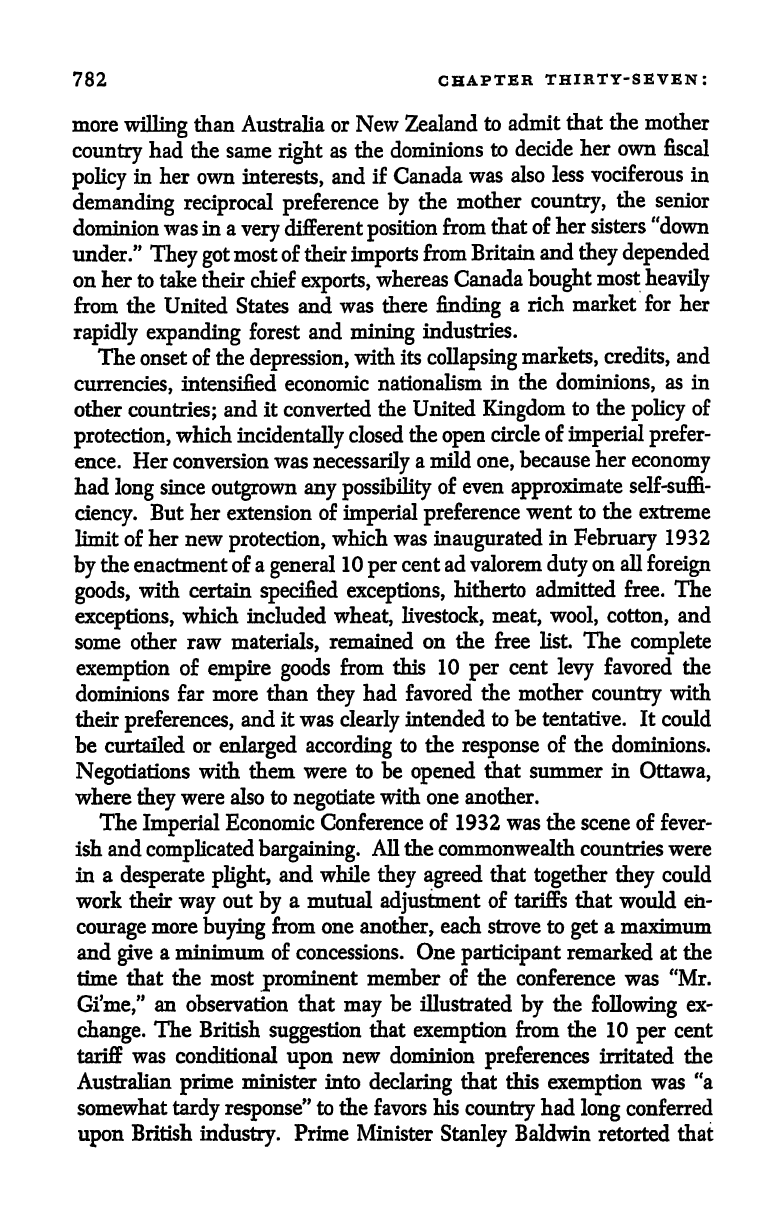
782
CHAPTER
THIRTY-SEVEN:
more
willing
than
Australia or
New
Zealand
to
admit
that
the
mother
country
had the same
right
as the
dominions
to
decide
her
own
fiscal
policy
in her own
interests,
and if Canada
was
also
less
vociferous
in
demanding
reciprocal preference
by
the
mother
country,
the
senior
dominion
was in a
very
different
position
from
that of
her sisters
"down
under."
They got
most of
their
imports
from
Britain
and
they
depended
on her
to take their chief
exports,
whereas Canada
bought
most
heavily
from the United States and
was there
finding
a
rich
market
for
her
rapidly
expanding
forest
and
mining
industries.
The onset
of
the
depression,
with
its
collapsing
markets,
credits,
and
currencies,
intensified economic
nationalism
in
the
dominions,
as
in
other
countries;
and it converted
the United
Kingdom
to
the
policy
of
protection,
which
incidentally
closed
the
open
circle of
imperial prefer-
ence. Her conversion was
necessarily
a mild
one,
because
her
economy
had
long
since
outgrown
any
possibility
of
even
approximate
self-suffi-
ciency.
But her
extension
of
imperial
preference
went
to the
extreme
limit
of
her new
protection,
which
was
inaugurated
in
February
1932
by
the enactment of
a
general
10
per
cent ad valorem
duty
on
all
foreign
goods,
with certain
specified exceptions,
hitherto
admitted free. The
exceptions,
which
included
wheat,
livestock, meat,
wool,
cotton,
and
some other raw
materials,
remained
on
the
free list.
The
complete
exemption
of
empire
goods
from
this
10
per
cent
levy
favored the
dominions
far
more
than
they
had favored
the
mother
country
with
their
preferences,
and
it was
clearly
intended to
be
tentative.
It
could
be curtailed or
enlarged
according
to the
response
of
the dominions.
Negotiations
with them
were
to be
opened
that summer
in
Ottawa,
where
they
were also to
negotiate
with one another.
The
Imperial
Economic Conference
of 1932 was the scene
of fever-
ish
and
complicated
bargaining.
All
the commonwealth
countries were
in a
desperate plight,
and while
they
agreed
that
together they
could
work
their
way
out
by
a
mutual
adjustment
of tariffs that
would en-
courage
more
buying
from one
another,
each strove to
get
a maximum
and
give
a minimum of concessions.
One
participant
remarked at
the
time
that the
most
prominent
member of the
conference was "Mr.
Gi'me,"
an observation that
may
be
illustrated
by
the
following
ex-
change.
The British
suggestion
that
exemption
from
the 10
per
cent
tariff was conditional
upon
new dominion
preferences
irritated
the
Australian
prime
minister
into
declaring
that
this
exemption
was
"a
somewhat
tardy
response"
to the
favors
his
country
had
long
conferred
upon
British
industry.
Prime
Minister
Stanley
Baldwin
retorted
that
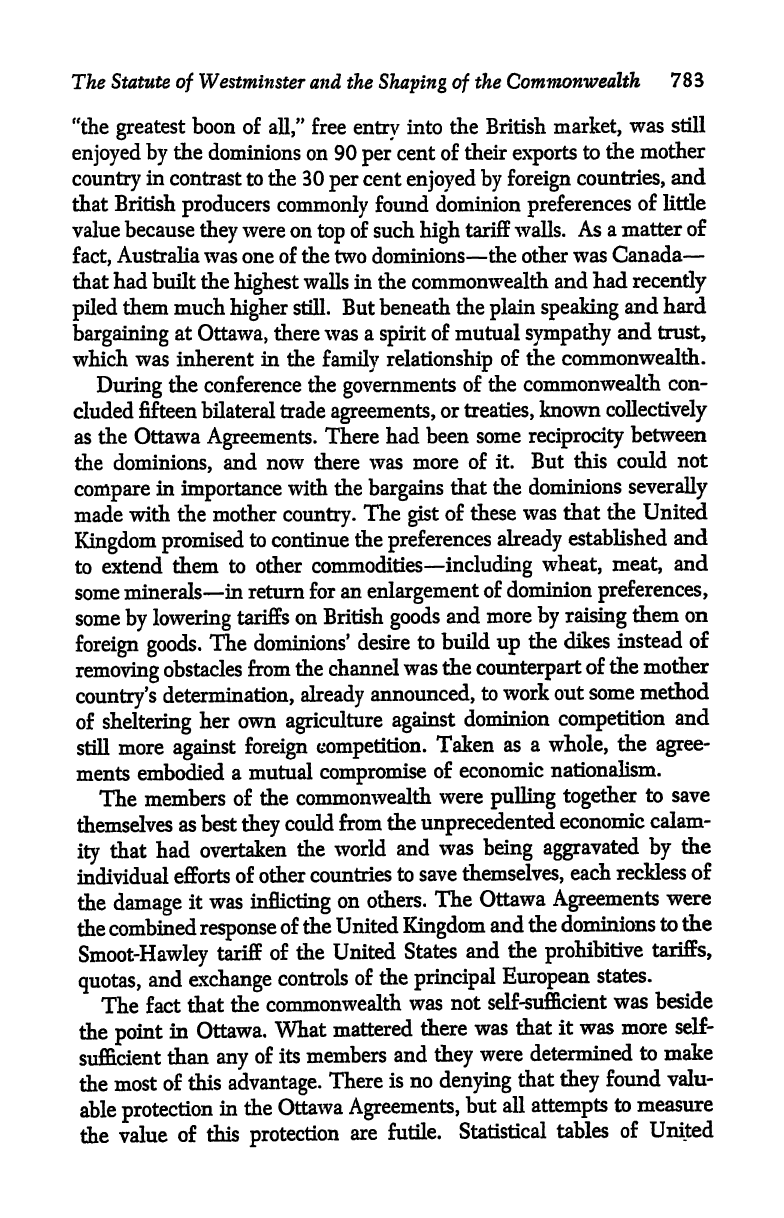
The
Statute
of
Westminster
and
the
Shaping
of
the
Commonwealth
783
"the
greatest
boon
of
all,"
free
entry
into
the British
market,
was
still
enjoyed
by
the
dominions
on 90
per
cent of
their
exports
to
the
mother
country
in
contrast
to
the
30
per
cent
enjoyed
by
foreign
countries,
and
that
British
producers
commonly
found
dominion
preferences
of little
value because
they
were on
top
of
such
high
tariff
walls.
As
a matter
of
fact,
Australia
was one of the
two dominions
the other
was
Canada
that
had
built
the
highest
walls
in the
commonwealth
and
had
recently
piled
them much
higher
still.
But beneath
the
plain speaking
and
hard
bargaining
at
Ottawa,
there was a
spirit
of mutual
sympathy
and
trust,
which
was
inherent
in the
family
relationship
of
the
commonwealth.
During
the
conference the
governments
of
the commonwealth
con-
cluded
fifteen bilateral trade
agreements,
or
treaties,
known
collectively
as the Ottawa
Agreements.
There had
been
some
reciprocity
between
the
dominions,
and now
there
was more
of
it.
But
this could
not
compare
in
importance
with
the
bargains
that the
dominions
severally
made
with the mother
country.
The
gist
of
these
was that
the United
Kingdom
promised
to
continue
the
preferences
already
established
and
to
extend
them
to other
commodities
including
wheat,
meat,
and
some
minerals
in
return for
an
enlargement
of
dominion
preferences,
some
by
lowering
tariffs
on
British
goods
and
more
by raising
them on
foreign
goods.
The
dominions'
desire
to build
up
the
dikes
instead of
removing
obstacles
from
the
channel
was
the
counterpart
of
the mother
country's
determination,
already
announced,
to
work
out
some
method
of
sheltering
her own
agriculture
against
dominion
competition
and
still
more
against
foreign
competition.
Taken
as
a
whole,
the
agree-
ments
embodied
a
mutual
compromise
of
economic
nationalism.
The
members
of
the
commonwealth
were
pulling
together
to
save
themselves
as best
they
could
from
the
unprecedented
economic
calam-
ity
that
had
overtaken
the world
and
was
being
aggravated
by
the
individual
efforts
of other
countries
to
save
themselves,
each
reckless of
the
damage
it was
inflicting
on
others.
The
Ottawa
Agreements
were
the
combined
response
of the
United
Kingdom
and
the
dominions
to
the
Smoot-Hawley
tariff
of
the
United
States
and
the
prohibitive
tariffs,
quotas,
and
exchange
controls
of
the
principal
European
states.
The fact
that
the
commonwealth
was
not self-sufficient
was
beside
the
point
in
Ottawa.
What
mattered
there
was that
it
was more self-
sufficient
than
any
of its
members
and
they
were
determined
to
make
the
most
of
this
advantage.
There
is
no
denying
that
they
found valu-
able
protection
in
the
Ottawa
Agreements,
but all
attempts
to
measure
the
value
of
this
protection
are
futile.
Statistical
tables
of
United
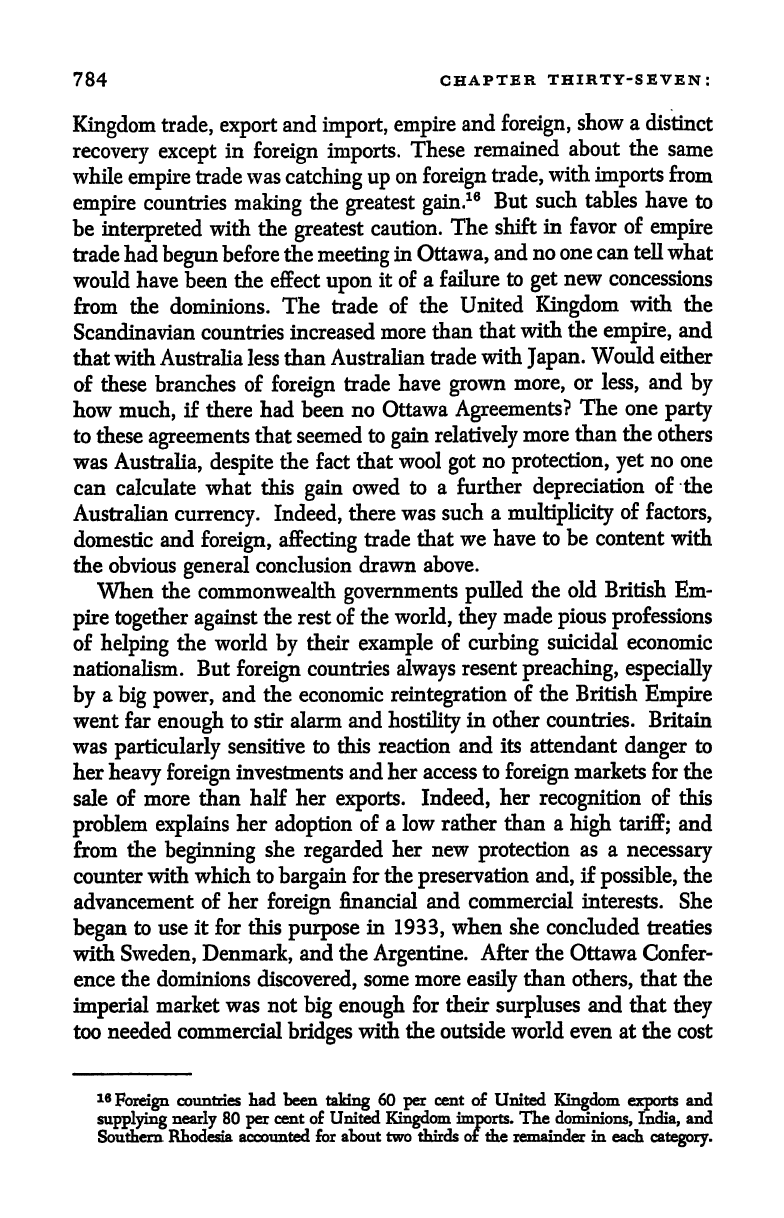
784
CHAPTER
THIRTY-SEVEN:
Kingdom
trade,
export
and
import,
empire
and
foreign,
show
a
distinct
recovery
except
in
foreign
imports.
These
remained
about
the
same
while
empire
trade
was
catching
up
on
foreign
trade,
with
imports
from
empire
countries
making
the
greatest
gain.
16
But
such tables
have
to
be
interpreted
with
the
greatest
caution.
The
shift
in
favor of
empire
trade had
begun
before
the
meeting
in
Ottawa,
and
no one
can
tell
what
would have been the effect
upon
it of
a failure
to
get
new
concessions
from
the dominions. The trade
of
the
United
Kingdom
with
the
Scandinavian
countries increased
more than
that
with
the
empire,
and
that with Australia less than
Australian
trade
with
Japan.
Would either
of
these
branches
of
foreign
trade
have
grown
more,
or
less,
and
by
how
much,
if there
had
been
no Ottawa
Agreements?
The one
party
to
these
agreements
that
seemed to
gain
relatively
more
than
the
others
was
Australia,
despite
the fact
that
wool
got
no
protection,
yet
no
one
can
calculate
what
this
gain
owed to
a further
depreciation
of
the
Australian
currency.
Indeed,
there
was
such
a
multiplicity
of
factors,
domestic
and
foreign,
affecting
trade
that
we
have
to be
content with
the obvious
general
conclusion
drawn
above.
When
the
commonwealth
governments
pulled
the
old
British
Em-
pire
together
against
the rest of the
world,
they
made
pious
professions
of
helping
the world
by
their
example
of
curbing
suicidal
economic
nationalism.
But
foreign
countries
always
resent
preaching,
especially
by
a
big
power,
and
the
economic
reintegration
of
the British
Empire
went far
enough
to stir
alarm
and
hostility
in
other
countries.
Britain
was
particularly
sensitive
to this reaction and
its attendant
danger
to
her
heavy
foreign
investments and
her access
to
foreign
markets for
the
sale of more
than
half
her
exports.
Indeed,
her
recognition
of this
problem
explains
her
adoption
of
a low
rather
than a
high
tariff;
and
from
the
beginning
she
regarded
her
new
protection
as
a
necessary
counter
with
which to
bargain
for
the
preservation
and,
if
possible,
the
advancement of
her
foreign
financial and commercial interests. She
began
to use
it for
this
purpose
in
1933,
when she
concluded
treaties
with
Sweden,
Denmark,
and the
Argentine.
After
the
Ottawa
Confer-
ence
the
dominions
discovered,
some
more
easily
than
others,
that the
imperial
market was not
big enough
for
their
surpluses
and
that
they
too
needed commercial
bridges
with
the outside
world even at the cost
16
Foreign
countries
had
been
taking
60
per
cent of
United
Kingdom
exports
and
supplying nearly
80
per
cent
of
United
Kingdom imports*
The
dominions;
India,
and
Southern.
Rhodesia
accounted for
about two
*hir<3g
of
the remainder in
each
category.
